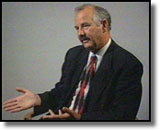
Devolution and Education

|
| Ken Macdonald: Science and Education Correspondent |
One of the reasons Scotland has retained such a strong sense of identity, despite 290 years of union with a much larger and more powerful entity, is the difference in its education system. This system differs from its southern counterparts in anumber of ways:
1. Parents
Parents tend to play a greater role in Scottish education than their southern counterparts and generally they view state education as being hugely important. The reason for this is twofold. Firstly, Scottish parents are hugely aspirational for their children and secondly, education is viewed by them as one of the pillars of the Scottish identity. This dates from the time when every parish had to have a school. As the two other pillars of Scottishness - the Kirk and the Law - are in a poorer state, education has taken on even more importance of late.
It has largely been the concerns of parents which have forced education towards the top of the top of the political agenda in Scotland. Another indicator of the regards in which most Scottish parents seem to hold state schooling is how small the independent/public school sector is in Scotland: only about 4% of children use private schools, roughly half the English level.
2. Curriculum
There is no national curriculum in Scotland, or at least not in the English sense. Formally, it is the education authorities (ie: local councils), head and classroom teachers who decide what is taught. One of the Big Ideas which has always dominated Scottish education is that the whole person is taught - not just the part that enables a pupil to pass an exam or secure a job.
Curriculum guidelines are laid down by Government inspectors but there is not the same rigidity in the system as in England.
3. Exams
There are no GCSEs or A Levels in Scotland, except in some private schools. Children tend to do their Standard Grades in fourth year at secondary school followed by a two term dash to the main school leaving exams, the Highers. Three Highers tend to be the benchmark for university entrance. Another of the Big Ideas comes in here - the idea of breadth. Children tend to sit four, five or even more Highers across a range of subjects whereas English pupils tend to specialise earlier.
There is just one exam authority, the Scottish Examination Board (SEB), to oversee all these exams. England has about half a dozen, some being accused of giving easier exams than others.
4. Schools
Schools have been fully comprehensive since the mid-Seventies. Children tend to start the year they turn five, spend seven years in primary school and then five or six in secondary school. There are no "middle schools" as in some areas of England. There are no LEAs in Scotland either, that role is performed by the local authorities.

|
| Glasgow University graduates |
Historically, Scotland's universities were the only part of her education system not to be run from Edinburgh. This changed only a few years ago when power over them was devolved from Whitehall to the Scottish Office. But despite superficial similarities, Scottish higher education is very different from its English counterpart. More school leavers than ever before - 43% - are going on to degree or diploma courses. Scotland has just 9% of the UK population but has 12% of its university places. 30% of students in the sector are studying higher education courses at further education collages, many using diplomas as a first step towards a full degree. Scottish universities attract many students from elsewhere in the UK, at two of them - Edinburgh and St. Andrews - Scots undergraduates are actually in the minority.
Scotland enjoys higher levels of public spending on education than England does, at the moment some 28% more per head. With Westminster seemingly able to respect the distinctiveness of the education system north of the border and generously fund it into the bargain, does Scottish education really need a Scottish parliament at all?

|
| Lindsay Patterson: distinctiveness eroded |
One possible role that devolution's backers have already outlined for a Scottish parliament is in taking a tighter grip on Scotland's university sector. The reversal of the introduction of tuition fees and bringing back a full student grant are two of the measures that are being discussed by Yes campaigners and educationalists. However, warnings are also being sounded that these measures couldn't be enacted overnight even if the money could be found to pay for it. "Whether a Scottish parliament would want to modify substantially the proposals in the Garrick report for the introduction of tuition fees and so forth, is something which we wouldn't know for four to five years yet," believes Douglas Mair, head of the Economics department at Heriot Watt University.

|
| Professor Midwinter: 'parliament complicates' |
Some believe that with the establishment of a Scottish parliament it could become a classroom in itself. It is obvious that a new assembly would avail itself of the most up to date communications technology and that this could be used by school pupils in order to give them a greater understanding of the democratic process. Lindsay Patterson believes a Scottish parliament "could encourage young people to come in to study the parliament on its premises, to use developed video or electronic facilities, computer facilities to get ......... a real working practical knowledge of how democracy operates. That would change the prospects of the next generation as far as democracy is concerned."


